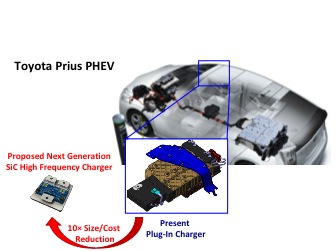
FAYETTEVILLE, Ark. – A $3.9 million award from the U.S. Department of Energy will allow electrical engineering researchers at the University of Arkansas to continue contributing to the development of a compact and highly efficient silicon-carbide charger for hybrid electric vehicles. The benefits of the project extend beyond vehicles into other areas, such as wind and solar power, and could lead to reduced energy consumption in the United States.
“We are excited to be part of this important project,” said Alan Mantooth, professor and director the university’s National Center for Reliable Electric Power Transmission. “I am confident that this effort will lead to breakthroughs in efficiency, size and weight reduction, and overall improved vehicle performance. Together we are creating the next generation of charging electronics for electric vehicles.”
The grant is part of the DOE’s Advanced Research Projects Agency-Energy (ARPA-E) program and will benefit a collaborative partnership that includes five private and public entities – the National Center for Reliable Electric Power Transmission; Arkansas Power Electronics International, Inc.; Oak Ridge National Laboratory; Cree, Inc.; and Toyota Motor Engineering & Manufacturing North America, Inc. Arkansas Power Electronics International, the overall leader of the project, is a private partner of the National Center for Reliable Electric Power Transmission.
Under Mantooth’s direction, the Arkansas researchers will develop basic semiconductor device models that will enable other researchers to design integrated circuitry. The work will help engineers simulate circuits on computers to verify functionality before committing to fabrication. As part of the overall project, university researchers will also design key components of the charging circuitry.
Since 2009, the DOE has allocated a total of nearly $350 million to universities, small and large businesses, national labs and nonprofit groups to support research that can change how the United States generates, stores and uses energy. As part of the American Recovery and Reinvestment Act of 2009, the funding is intended to create jobs and foster economic growth.
“These innovative ideas will play a critical role in our energy security and economic growth,” said U.S. Secretary of Energy Steven Chu. “It is now more important than ever to invest in a new, clean energy economy.”
“We are thrilled at the opportunity to collaborate with our partners on a project that will accelerate innovation in clean energy technologies for our future,” said Serdar Yonak, Toyota’s U.S. power electronics research and development manager. “The award was highly competitive, and we look forward to delivering on the challenges in this groundbreaking project.”
“APEI, Inc. is extremely excited about the opportunity to lead this effort to develop a highly-efficient, silicon carbide-based battery charger for next generation plug-in electric vehicles,” said Ty McNutt, director of business development for the Fayetteville company. “This technology will help reduce energy consumption in everyday applications, such as personal vehicles. In addition, it will reduce the strain on the nation’s power grid as electric vehicles become prevalent, while helping to decrease the nation’s carbon footprint. Equally as important, the engineering and manufacturing jobs created by this award will remain in America.”
“Cree has been leading the development of the silicon carbide power components at the heart of this proposed system, and we are very gratified to be working with this team to deliver the efficiency benefits of this technology to the hybrid car owner,” said John Palmour, Cree’s chief technology officer for power and radio frequency. “This compact charger application is a great start, and we are hopeful that this demonstration will lead to the use of silicon carbide power devices in the electric motor drives themselves, creating even more efficiency gains for hybrid vehicles.”
The National Center for Reliable Electric Power Transmission is one of only a few university-based research centers chosen by the DOE to investigate electronic systems to make the nation’s power grid more reliable and efficient. Five years ago, the DOE funded the center because of the university’s research expertise in advanced power electronics and longtime investigation of silicon carbide, a semiconducting material that is more durable and faster than materials currently used in the power grid. Electrical engineering researchers at the university have developed and packaged silicon-carbide systems for more than a decade and recently won an R&D 100 Award, in collaboration with Arkansas Power Electronics International Inc., for the first 250-degree Celsius-capable power module rated at 1,200 volts and 150 amperes.
Mantooth holds the 21st Century Endowed Chair in Mixed-Signal IC Design and CAD.
Topics
Contacts
Alan Mantooth, professor, department of electrical engineering
College of Engineering
479-575-4838, mantooth@uark.edu
Matt McGowan, science and research communications officer
University Relations
479-575-4246,
dmcgowa@uark.edu